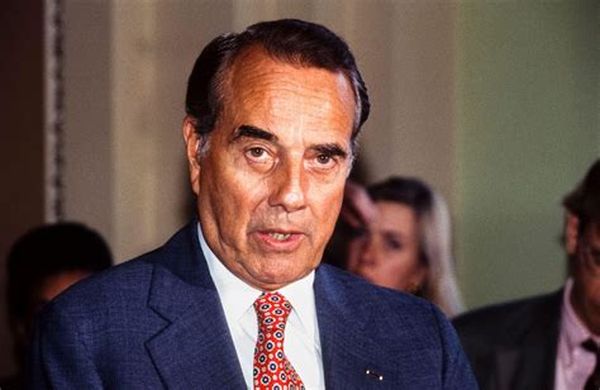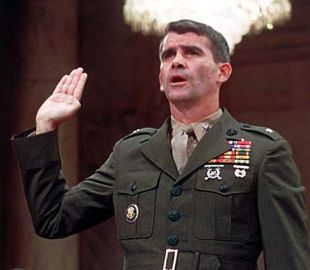Where’s the outrage?
“Where’s the outrage?” cried Bob Dole towards the end of his losing campaign for the presidency in 1996. His words linger on in the American consciousness long after the would-be scandal that prompted them has been forgotten. Didn’t it have something to do with foreign contributions to the Bill Clinton campaign coffers? Anyway, the putative outrages of 1996 didn’t seem like much to go on, outrage-wise, to anybody other than Mr Dole at the time. And two years later, when Monica-gate broke, Republican outrage was met by a rather more than equal and opposite outrage from Democrats, livid that their president was being impeached over what they regarded as a trivial sexual peccadillo.
In hindsight, after more than a quarter of a century, both sides in this outrage-filled tug-of-war appear to have been a bit hysterical. Didn’t we all have more important things to worry about in 1998 than whether or not our president was fooling around with an intern and, if so, whether or not it, or lying about it, amounted to a high crime and/or misdemeanor? But that’s just it. We sort of didn’t. Have anything more important to worry about, I mean. Or so it seemed. Things were going pretty well for the country in 1998, and we could afford to pour rivers of ink and devote tons of newsprint to what amounted to celebrity gossip. Or so it seemed.
Way back in 2007 I wrote in this space of the moment, even further back in January,1994, when I realized that a page had been turned in our long national story (see “Time on the cross of hype” in The New Criterion of March, 2007). The Cold War was over, the Soviet Union was a thing of the past and the Russians were our friends. Or so it seemed. “The worst economy in 50 years” (per Bill Clinton, just over a year earlier) had suddenly righted itself and was purring like a well-tuned engine. Listening to the ABC radio network one day I heard at the top of the lunchtime news something that was not news as I had known it, or thought I had known it, all my life to date, but the latest in the saga of Tonya Harding and Nancy Kerrigan.
If you can’t remember who Ms Harding or Ms Kerrigan were and are you’re well ahead of those of us who only wish our memories were not cluttered up with such trash — of which, of course, there was much more to come. A few months later it was the beginning of the O.J. Simpson saga, which ran and ran through the rest of that and most of the following year. By the time Bob Dole issued his cri de coeur, a year after O.J.’s outrageous (or not) acquittal, our national stock of outrage had already been expended, seemingly, on celebrity news and trivialities.
Which is what the Bill and Monica story became too, naturally enough. Whatever outrage it generated on either side was of the ersatz variety, designed to be turned to partisan advantage by one political team or the other with the help of the media — who were ever and increasingly on one team rather than the other. It was about that time, curiously enough, that the public trust in the media began the precipitous decline from which it has never since recovered.
For a while it seemed that we had all been brought back down to earth by the genuine outrage of the 9/11 terror attacks. But the longer the Iraq War dragged on and the less it appeared to have anything to do with 9/11, the more that that, too, began to occasion only hyped-up, politicized outrage, on both sides, as in the Bill and Monica days. Was there anything real about the “War on Terror,” people asked themselves — I mean apart from the opportunities it provided for one side or the other to gain an edge in the increasingly bitter partisan struggle that has continued down to the present day?
We now know that the biggest gainers from that war were those in the security state whose powers and budgets were so much enhanced by the Patriot Act and then re-purposed under President Obama to counteract those in the other party whom it designated as “domestic extremists” (see “On some moral hazards” in The New Criterion of May, 2023). This ultimately produced what Michael Lind calls a “McCarthyism of the Centre” — something “which is far more dangerous to liberty and democracy than the right-wing Cold War version, because it is backed by many senior politicians, government agencies, social-media platforms, businesses, banks, media and the academy.”
At last! Here was something to be genuinely outraged about. Or so you might think. And yet public outrage at the wholesale politicization of the Justice Department and much of the federal bureaucracy, has been oddly muted, and largely confined to those of us in the right-wing media ghetto. One is tempted to conclude that, after 30 years of media-manufactured outrage over scandal after would-be scandal, we seem to have lost the knack for recognizing real outrages when we see them.
Donald Trump, though he is the principal victim of this politicization of the legal system, must bear some share of responsibility for the public de-sensitization to real outrage. He was the one who started the crowds chanting “Lock her up!” about Hillary Clinton and — what was it again? The private server? The missing e-mails? The shakedowns of foreign plutocrats on behalf of the Clinton foundation when she was Secretary of State? I forget. But as she herself said, however disingenuously, about the murder of our ambassador to Libya in Benghazi in 2012 — the one incident of her tenure that might otherwise have been recognized as a real outrage — “What difference at this point does it make?”
“At this point,” of course, referred to the point, two or three years after the 2012 election, when she thought that her own bungling, which had contributed to the ambassador’s murder, could no longer produce any deleterious political effects either for her or for her party. As with so many politicians, I suppose, the only kinds of differences she cared about making or not making were political ones. And of course the same could be said about Mr Trump’s “Lock her up!” It was never intended as anything but his own turn at the “outrage” game, designed to give himself a political advantage over her.
He has continued to make outrageous outrage his political speciality ever since. One example is the recent invitation to Russia to invade any NATO country that wasn’t pulling its weight in terms of defense expenditure. My friend Byron York, writing for the Washington Examiner, persuasively analyzed the Trumpian strategy here in evading the media’s attempts to starve his campaign of the oxygen of publicity:
The blackout has created a perverse incentive for the former president. If Trump says something outrageous from the podium, the news organizations will drop their bans and play that portion of the speech for the purpose of fact-checking and denouncing it. They then hold panel discussions on how terrible Trump is. If, on the other hand, Trump does not say something sufficiently outrageous — crickets. So the way for Trump to win coverage, indeed, to dominate coverage on the networks that have blacked him out is to say something outrageous enough for them to put him on the air.
I think it actually goes further than his courting of free publicity. Every time he forces the media-Democratic outrage machine into high gear he also reinforces a growing sense of the phoniness of that outrage. He knows that politics has become a game of superheroes and supervillains played out before an audience accustomed to such entertainments from childhood. And the more he makes this essential unseriousness evident to others, the better his chances of turning their attention away from the Grand Guignol to the real-world problems currently being neglected by his opponents in favor of their own self-righteous moralizing and virtue-signaling.
Indeed, many of those problems have been made worse by the media-Democrat commitment to obsessing about the moral drama that is now in the ninth year of its run. How can we explain the current crisis at the southern border, for example, without reference to President Biden’s having made it his first order of business on taking office to undo all that his predecessor had done to prevent it — not because it wasn’t working or even just a bit helpful in stemming the tide of illegal immigration but because Mr Trump, the Bad Man ex hypothesi, had done it?
The outrage over Mr Trump’s remarks about NATO, referred to by Byron York, had hardly had a chance to die down before he said something even more outrageous. He took the occasion of the death in prison of Aleksei Navalny at the hands of Vladimir Putin’s goon squad to compare himself, on account of his legal persecution by the Biden Justice Department and local Democrat prosecutors, to the martyred Russian dissident.
Once again, he could not but have known the indignation with which such a comparison would be treated by his many enemies, particularly coming against the background of eight years of his being called Mr Putin’s stooge. We might reflect, however, that if it was fair for those enemies to compare him, as they routinely have done, to the Russian dictator, then it also must be fair for him to compare himself to that dictator’s principal domestic enemy — and, by implication, President Biden to President Putin. Turnabout is fair play, though it again raises the question of why we find ourselves playing this macabre game of moral one-upmanship instead of debating more substantive matters.
The incident followed a familiar pattern:
- Trump makes an exaggerated comparison in his own self-interest or for self-aggrandizement;
- Exaggerated media/Democrat outrage at his exaggeration ensues;
- The real point of the comparison, the kernel of truth beneath the exaggeration is forgotten;
- Trump is convicted of being an outrageous exaggerator. Again.
- Rinse, repeat.
It’s easy to see what the media and the Democrats have to gain from this little charade, this whipping up of outrage on both sides for its political utility to each. Only people who are already Trump fans will think of or remember the unpalatable truth beneath the exaggeration: that both the Russian and the American presidents have corrupted their country’s legal system to use it against their political enemies. But how is it in Mr Trump’s interest to keep feeding the media-Democrat outrage machine like this?
I don’t know, but it’s hard to see what else he can do in the situation in which his outraged and outrageous enemies have placed him — and all of us too. The great Mary Harrington, after denying any wish to make any invidious comparisons herself, sums it up nicely:
Nonetheless, it should be clear that a new consensus is solidifying among the American political class: one that departs increasingly dramatically from its British constitutional forebear. In this emerging order no one expects to persuade their opponents. This is perhaps understandable: polarisation is now so acute in the Land of the Free that almost two-thirds of young Americans would reject a prospective partner based on incompatible politics. There is no point contesting ideas, if people’s loyalties are tribal. But if this is so, how do you win? The answer appears to be: by capturing institutions, then going after the other tribe’s leader. There is no such thing as neutral regulatory, governance or administrative infrastructure in this existential struggle against political opponents.
There’s a reason why it helps to have a foreign perspective like Ms Harrington’s on what’s going on in this country, and it is pointed up by the frequent mention among Mr Trump’s domestic detractors of what used to be called, when the Left was practising it, “moral equivalence” between some foreign dictatorship or despotism and the good old USA. Here, for instance, is Jonah Goldberg on how “Navalny’s Death Sheds Light on the Moral Rot of the American Right” — the same American Right of which he himself was once one of the brightest ornaments. “There are ample plausible criticisms of the legal cases against Trump,” he writes, “but even if you agree with all of them (I don’t) the notion that Joe Biden is the moral equivalent of Vladimir Putin is a slander, not merely of Biden but of America itself.”
I think there must be a lot of old-style Bush conservatives like Jonah who assume that Mr Trump’s complaints about the lawfare, or the legal rigging of the electoral system against him by Democrats, must be not just wrong but anti-American because they still can’t get their minds around the idea of such corruption in the country they love and want to believe in. To them it must be axiomatic that, in the ironic words of the Sinclair Lewis novel of 1935, “It can’t happen here.” And they can always rely on the charge of “conspiracy theory” to justify their turning a blind eye to something that seems so obvious to old-style lefties like Matt Taibbi or Glenn Greenwald, who are more accustomed to looking askance at America and the American political system and therefore see more of what a dispassionate outsider would see.
The answer to Bob Dole’s question, “Where’s the outrage?” is that, now as then, it’s all in the other party. The Democrats are still, as they always have been, the outrage specialists. But they became so when they were the party of the little guy standing up to the party of the establishment. But now the parties have changed places, in this as in so many other ways. Now the Democrats are the party of the status quo and the self-satisfied governing classes while the Republicans are still getting used (or not getting used) to being the party of the outsiders and therefore of rage against “the system” that is keeping them down.
Meanwhile, the Democrats, who occupy the commanding heights of the political, economic and cultural life of the country, appear to be having an even harder time adjusting to their new role of defending things-as-they-are — meaning the social and educational order that puts them, seemingly permanently, at the top. And things-as-they-are now include all the top-down revolutionary changes being introduced by them under the guise of saving the country from Mr Bad-man Trump. Not knowing what else to do with it, they have turned their habitual outrage on the imaginary but nonsensical “threat to democracy” represented by the man who might just manage to get more votes than they do in November and must therefore be taken off the ballot by any undemocratic means necessary. Where’s the outrage about that? I’m very much afraid that if it is ever to be found, it must be found among the Democrats.
Discover more from James Bowman
Subscribe to get the latest posts to your email.







